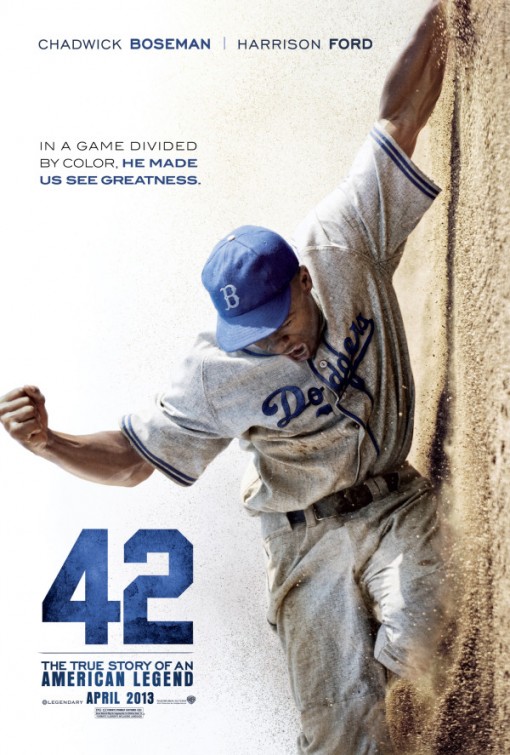https://www.youtube.com/watch?v=N5zRN6rU7eU
The movie 42,
directed and written by Brian Helgeland, tells the true-life story of Jackie
Robinson and his historic journey through the Brooklyn Dodges baseball
organization, becoming the first African American baseball player to ever play
in a Major League Baseball game.
Throughout the movie, Jackie goes through non-stop adversity, receiving
death threats, fastballs thrown at his head, fans calling him racial slurs, and
even his own teammates refusing to play on the same team as another black man;
so much adversity that it leaves the audience in a “jaw dropped” state of mind
when
thinking about how a person could really take so much negativity and hate in their
life. As seen in the film, there are
many places and spaces in the movie that make arguments about the movie’s society,
culture, time period, tone, mood, and many others, but none more is seen than
the scene that involves the place of Jackie Robinson standing at the first base
of Brooklyn’s stadium as fans are yelling racial slurs at him, and a white
teammate of Jackie, Pee Wee Reese, comes up to Jackie and puts his arm around
him and looks up at all of the fans, signifying he does not care about Jackie’s
race.
This place in the film is iconic in showing the society and
culture during the time period of 1947-1956 for not only Major League Baseball,
but also the significance of racism in the United States during that time
period. The physical space consists of
Jackie standing on the first base as the fans are booing him and yelling, “get
off the field” from above in the stands.
The director is using ethos to create a sense
of ethics and credibility
for the society being shown, creating an exciting, yet sad mood to the place by
showing all of the fans booing and yelling at the only African American
baseball player on the field. This is all seen as the audience in todays society knows how wrong
it would be, today, to do that at a not only a baseball game, but any event. The director is also using the fans yelling
at Jackie as a tool of pathos, using the sounds and sight of everyone in the
stadium standing up and booing a person for the sole reason of the color of
their skin, creating an emotional appeal that the viewer has no other choice but to
connect with Jackie and subconsciously feel as if it is them standing in front
of everyone. Even though the viewers see
the society that Jackie is living in throughout many of the scenes leading up
to this place in the movie, it is this scene and place that the viewer has the
ability to come full circle and see what Jackie Robinson was really
going through during his time as the first and only African American baseball
player in Major League Baseball.
As Pee Wee Reese comes up to Jackie and puts his arm around
him, the crowd begins to boo even louder, using pathos to influence the viewer’s
emotions to fully understand what the culture was really like during that time
of baseball and in Jackie’s life. The
tone of the scene begins to turn from hectic to serious as the background sound
does the same by originally only hearing the loud sounds of boos that tend
“to be forceful, intense, and threating” (Sound, 208), to changing to a piano playing a slower, serious and inspirational, tune. “The faster the tempo of
sound, the greater the tension produced in the listening” (Sound, 208). In this case, the tension is beginning to
subside with the help of Pee Wee creating less
tension. Pee Wee then comes up to Jackie with
his arm around his shoulder and says, “thank you Jackie” while looking at all
the fans booing down at them, and continues to say, “I got family up there from
Louisville and I need them to know, I need them to know who I am”. Pee Wee is thanking Jackie for giving him the
opportunity to show his family from Kentucky, a notoriously racist state at the
time, that he does not look at people by the color of their skin, but looks at
people for who they really are on the inside and what they stand for. The director is using logos during this part
by trying to get the audience to think rationally and logically, making the
audience like the character of Pee Wee Reese, because he was the first teammate
to come to Jackie’s side during a publicly hard moment and look up at the crowd
and stand up for Jackie by putting his arm around him. Through Pee Wee’s body language, he is
telling everyone at the game that he does not care about Jackie’s skin color
and neither should they.
This is a very significant part of the movie, showing that
the culture in not only Major League Baseball is about change, but the entire
culture of the United States is also about to change when it comes to
thoughts about
a person’s skin color. The place is
arguing that the current time period’s culture, in the movie, of seeing people
for their skin color is about to change to seeing people for who they really
are and not the color of their skin. As
Pee Wee goes on to say, “Maybe tomorrow, we’ll all wear 42, so nobody could
tell us apart”.
Overall, I believe the movie 42 did an incredible job of using the space of Jackie standing on
the first base as the fans are booing him and yelling, “get off the field” from
above in the stands as Pee Wee comes up to him to show his support, in an
effort to show the movie’s arguments about society, culture, time period, mood,
and tone in the film. As a result, I
award the movie 42 five slurpees.









No comments:
Post a Comment